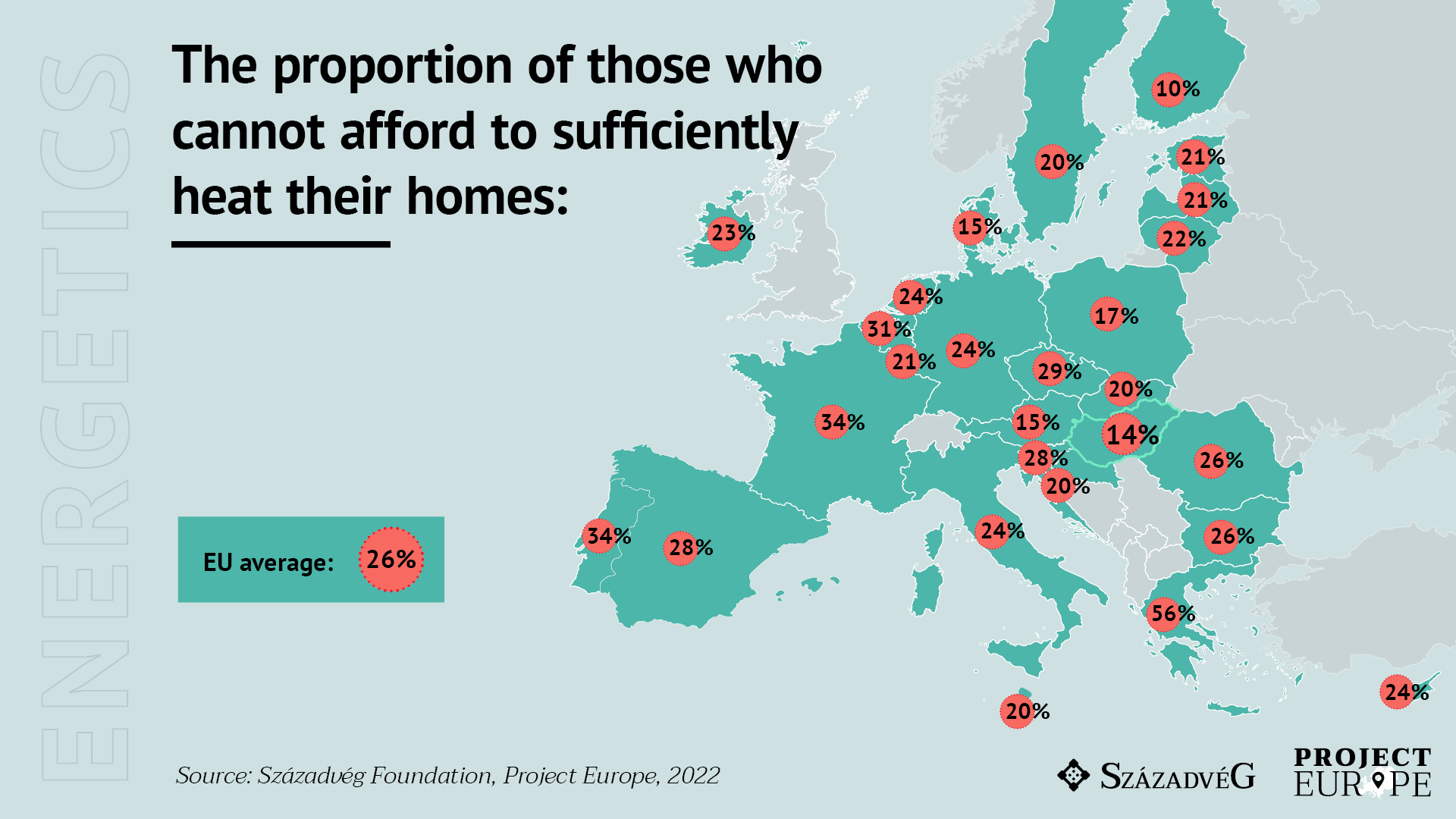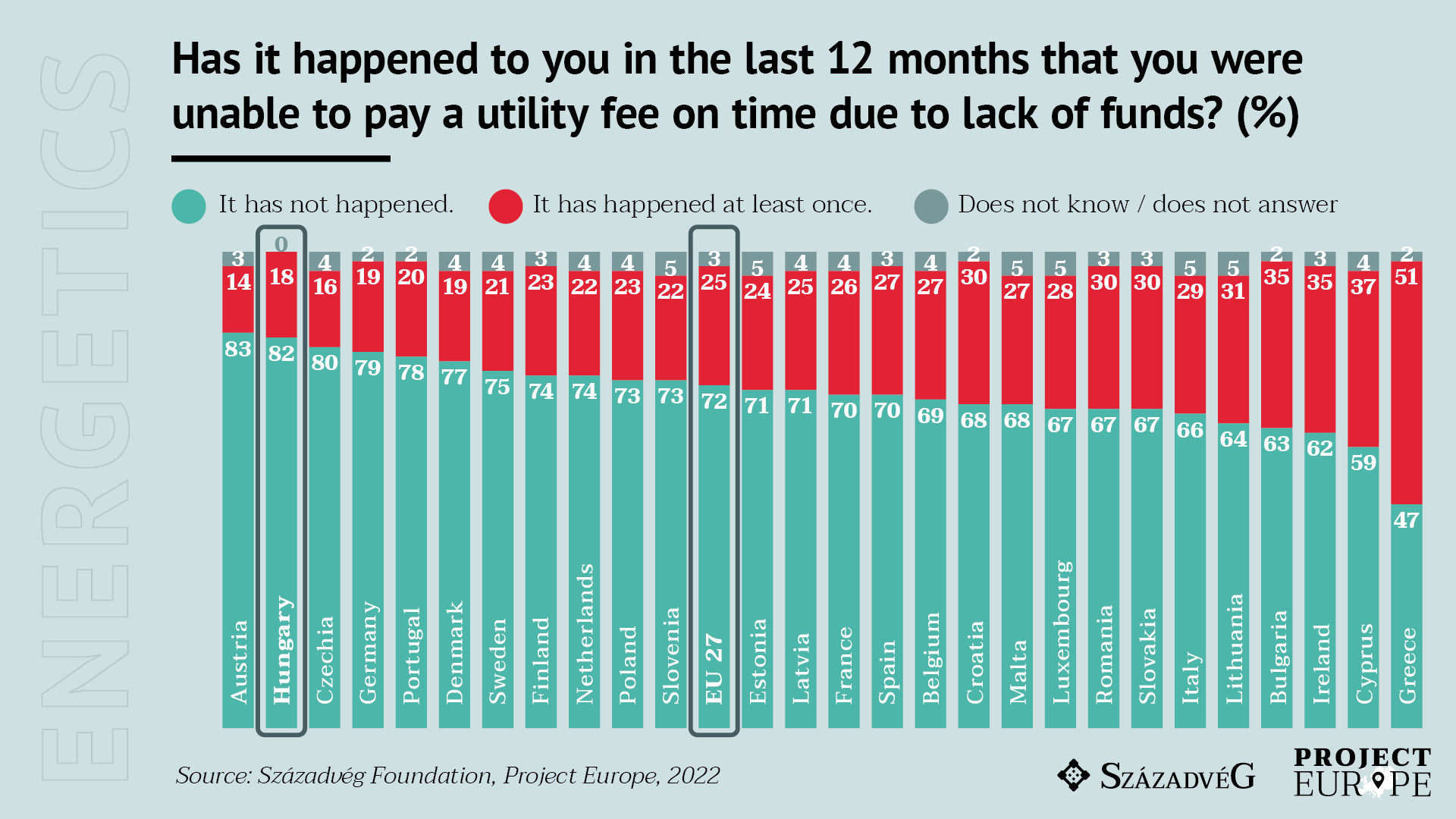The rise in energy prices caused by the escalating trade conflict between Russia and Europe poses increasingly serious challenges to EU countries. Individual Member States are using different official means to prevent the price explosion from spilling over into residential tariffs, but their effectiveness varies considerably. The most protective overhead support system operates in Hungary, where officially fixed tariffs ensure the lowest household energy prices in the EU. However, in countries with more permissive regulations, families have faced extraordinary price increases recently, which, if not compensated by sufficiently high incomes or state transfers, put households in an existentially vulnerable position. In the framework of the Project Europe Research, Századvég examined the proportion of the adult population in EU Member States struggling with heating and fee payment difficulties.
One in four Europeans cannot heat their home properly
According to Eurostat data, in 2021, 6.9 percent of households in the European Union (13.5 million households, 29.9 million persons) were unable to heat their homes sufficiently for existential reasons, and 6.4 percent (12.6 million households, 27.7 million persons) struggled with payment arrears. The autumn 2022 survey of Századvég predicts a dramatic deterioration of the situation1: It seems that the rise in energy prices has left a significant part of the population affected by the two problems. According to the results of the Project Europe Research, 26 percent of European citizens (more than 100 million people) are unable to heat their homes properly. However, as with the increase in household tariffs, there are also significant differences between Member States in the number of people experiencing heating difficulties.
The most difficult situation is in Greece, where more than half of the respondents (56 percent) say they are unable to heat their homes sufficiently. The second and third most serious situations are in Portugal and France, with a third of the population (34-34 percent) in both countries having difficulty in ensuring sufficient temperature. The least affected Member States are Finland (10 percent), Hungary (14 percent) and Austria and Denmark (14 percent each).
Fee arrears are increasing
In the last twelve months (compared to the autumn survey), one in four respondents have experienced at least once to be unable to pay one of their utility fees on time due to lack of funds. The situation in this category is also most serious in Greece, where 51 percent of the adult population is affected. In addition, more than a third of the population has payment difficulties in Cyprus (37 percent), as well as in Ireland and Bulgaria (35 percent). Hungary’s relative position in the payment arrears category is also favourable: the proportion of people affected is the third lowest after Austria (14 percent) and Czechia (16 percent), at 18 per cent.
In addition to overhead tariffs, the differences between Member States affected by heating and payment difficulties are also influenced by the income situation in each country and other transfers provided to compensate for the fees.
In the first half of 2016, the Századvég Foundation conducted a public opinion poll survey covering all 28 European Union Member States, with the aim to analyse the opinions of EU citizens regarding the issues that most affect the future of the EU. In a unique way, Project 28 conducted the widest possible survey of 1,000, that is a total of 28,000 randomly selected adults in each country. Gaining an understanding of society’s sense of prosperity and mapping the population’s attitudes towards the performance of the European Union, the migration crisis and the increasing terrorism were among the most important goals of the analysis. Following the surveys in 2017, 2018 and 2019, on behalf of the government, the Századvég Foundation has been conducting the research under the name of Project Europe since 2020, which continued to reflect on the topics that most dominated the European political and social discourse.
In 2022, the aim of the survey is again to map the population’s attitude towards the most important public issues affecting our continent. In addition to society’s sense of prosperity, the performance of the European Union, the coronavirus pandemic, climate change, and the perception of the migration crisis, in line with the latest challenges affecting Europe, the dominant theme of this year’s poll has been the Russian-Ukrainian war, the energy crisis, energy supply, and family policy. In addition to the European Union Member States, the 2022 research covered the United Kingdom, Norway, Switzerland, Moldova, Albania, Kosovo, North Macedonia, Montenegro, Serbia, Turkey, and Bosnia and Herzegovina, and surveyed a total of 38,000 randomly selected adults using the CATI method between 13 October and 7 December.
References
1 The EU-SILC survey which Eurostat is based on and Századvég research cannot be compared one-on-one due to the different methodology. However, the differences in the results are a good indicator of the deteriorating trend.


